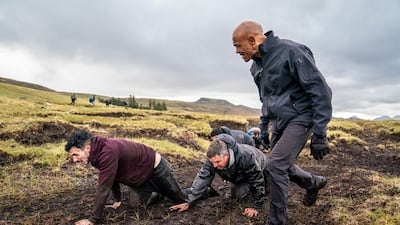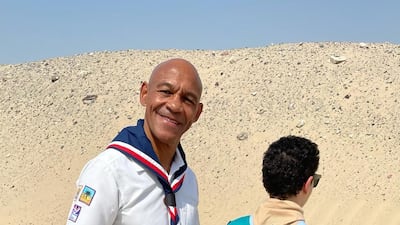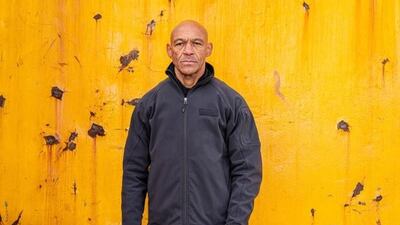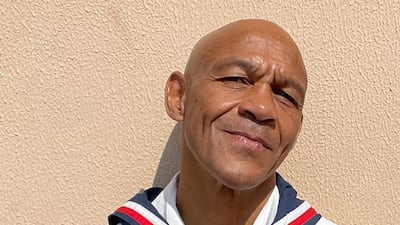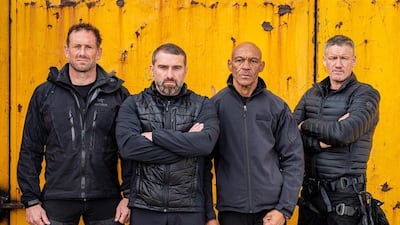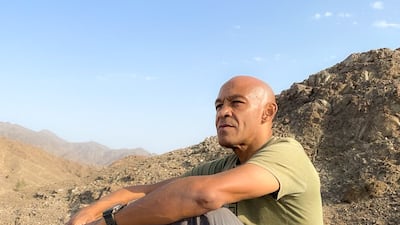A scout leader based in Dubai has reflected on his new-found fame after landing a starring role in the hit reality TV show SAS: Who Dares Wins.
Melvyn Downes, 56, joined the programme on Britain’s Channel 4 as a drill instructor, putting contestants through their paces on a course that mirrors the selection process for SAS recruits.
Several weeks into the new series, he has proven to be a hit for his uncompromising style, which includes screaming at contestants and kicking mud in their faces.
"It was amazing how it came about. During lockdown my wife asked me to watch it. I had never seen an episode before," he told The National.
“We watched it together and I thought it was authentic and realistic. Afterwards, my wife asked me if I would ever appear on it.
“I just laughed it off at the time but not long after I was approached by the producers and was asked to be part of it. I thought it was a wind-up at first but it wasn’t.”
Mr Downes is a veteran of the British armed forces, having served three tours of duty in Northern Ireland and in the first Gulf War.
He was an SAS soldier for 12 years, sent on top-secret missions around the world, which he is unable to talk about due to their classified nature.
The show sees Mr Downes as one of a team of five drill instructors charged with taking civilian recruits through gruelling tasks and conditions.
“What we do is take civilian recruits through a condensed 10-day version of a British elite forces course,” he said.
“It’s one of the toughest courses in the world, if not the toughest.
“It pushes them to their physical limits and tests their mental resilience.”

The contestants must endure a series of arduous tasks over the 10-day duration of the show, providing they can make it to the end.
These include running up mountains with 18-kilogram bags on their backs, abseiling down the side of an oil rig into the freezing-cold sea and crawling through narrow tunnels in the dark.
Lost comrades in Northern Ireland
“It’s not just a military-style boot camp. It’s very demanding and we want to get people back to basics,” said Mr Downes.
“People can push themselves much more than they know. Most people will never experience that unless they do something like this show.”
He told The National how he had a baptism of fire in Northern Ireland as a young soldier.
“I did three tours of Northern Ireland when I was young. I was 20 years old and seeing action for the first time. I had a friend die and others were injured,” he said.

“It was really confusing to be in part of your country, trying to help police with what was going on, and experience that.”
He also spoke about recent suggestions that ministers in the UK were considering making former soldiers and terrorists immune to prosecution for crimes committed during the Troubles in Northern Ireland.
This was a move that drew criticism from politicians on both sides of the border in Ireland, with the Northern Irish Deputy First Minister Michelle O’Neill calling it “a cynical move that will put British forces beyond the law”.
She also said it would be “another slap to the face of victims”.
“When I was there as a young 20-year-old, we were told we were there to do peacekeeping on both sides. As a young soldier you don’t really know much about it,” he said.
“You get given a task and it’s to support the police and govern by the law of the land.
“You follow your orders and there are very clear rules of engagement.
“You can’t engage or fire off a weapon unless your life is in danger and there is no other way of stopping that.”
Mr Downes said that even if someone opened fire on him and his colleagues, they were under strict orders not to fire back if the shooter was in the process of putting their weapon down or releasing it.
“As soon as the weapon is dropped you can’t engage that person and you wouldn’t do it,” he said.
“You literally have a split second to make a decision but it’s very difficult then, years later, to be prosecuted when you were acting to the letter of the law.
“Obviously, if somebody has blatantly broken the law then they should rightly be prosecuted.”
Protecting American TV news crews
After leaving the armed forces, Mr Downes served a spell protecting American news teams in conflict areas before making the Dubai his home, where he took up a position as a scout leader.
“When I came to the UAE I had time to become a leader with Fourth Dubai Scouts,” he said.
“Scouting is great, but since the pandemic it has all been online.
“One of the reasons I joined the Scouts was to help inspire people to follow their goals.”
He said his family had a shock when they saw him on television, barking orders on SAS: Who Dares Wins.
“I’ve been with my wife for 20 years and she said she’s never seen me so mean and angry,” he said.
“The kids found it funny.
“I told them ‘you’ve never seen me doing my job’. It is the same as when you are on a secret mission somewhere – you have to put family to the back of your mind and get on your operational head, do the job and then go back to being a normal family man.
“Every SAS operator has to be able to switch like that for the role.”
